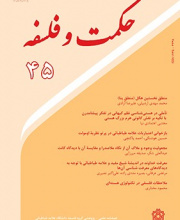
مقالات
شاخه زرین فریزر و ملاحظات ویتگنشتاین بر آن (عمل دینی و نحوه شکل گیری آن)
نسبت نظریه عدالت راولز با فلسفه حق هگل
بررسی و نقد دلیل عقلی اشاعره در اثبات رویت خدا
دریدا و مولوی در برابر فلاسفه
حوزههای تخصصی:
- حوزههای تخصصی فلسفه و منطق فلسفه غرب رویکرد تاریخی دوره معاصر (قرون 20 و 21) فلسفه قاره ای ساختارگرایی و پساساختارگرایی
- حوزههای تخصصی فلسفه و منطق فلسفه غرب رویکرد تاریخی دوره معاصر (قرون 20 و 21) فلسفه قاره ای پست مدرنیسم
- حوزههای تخصصی فلسفه و منطق فلسفه غرب رویکرد موضوعی فلسفه های مضاف فلسفه تطبیقی
- حوزههای تخصصی علوم اسلامی تصوف و عرفان اسلامی کلیات شخصیت ها[زندگینامه ها؛ اندیشه ها و..]
نقد و بررسی کتاب «راههای جنگلی»
Plantinga and the Logical Problem of Evil
حوزههای تخصصی:
The "logical problem of evil" is one kind of the "problem of evil." It is claimed that there is a logical inconsistency between belief in the existence of an omniscient, omnipotent, and wholly good God and belief in the existence of evil. Alvin Plantinga argued by his "free will defense" that they are consistent. In this paper I present his argument. Then three objections against his argument are mentioned. They are based on compatibilism, God's omnipotence, and God's knowledge of counterfactuals of freedom. Plantinga's responses to these come next. They are based on a counterexample, Leibniz's lapse, and transworld depravity. It is nearly accepted by all parties that Plantinga's defense is successful. Now the problem is the evidential one. For this problem to be solved, there must be a theodicy. And Plantinga gives one. But this is not successful at all. Muslims have to pay attention to this neglected area.
Faith, Hope and Doubt
حوزههای تخصصی:
For many religious people there is a problem of doubting various creedal statements contained in their religions. Often propositional beliefs are looked upon as a necessary, though not sufficient, condition, for salvation. This causes great anxiety in doubters and raises the question of the importance of belief in religion and in life in general. It is a question that has been neglected in philosophy of religion and Christian theology. In this paper I shall explore the question of the importance of belief as a religious attitude and suggest that there is at least one other attitude which may be adequate for religious faith even in the absence of belief, that attitude being hope. I shall develop a concept of faith as hope as an alternative to the usual notion that makes propositional belief that God exists a necessary condition for faith, as Plantinga implies in the quotation above. For simplicity’s sake I shall concentrate on the most important proposition in Western religious creeds, that which states that God exists (defined broadly as a benevolent, supreme Being, who is responsible for the creation of the universe), but the analysis could be applied mutatis mutandis to many other important propositions in religion (e.g., the Incarnation and the doctrine of the Trinity). I am not sure how these ideas fit into Islamic thought, but I offer up my paper to stimulate discussion between Christian and Islamic philosophy on the subjects of faith and doubt.